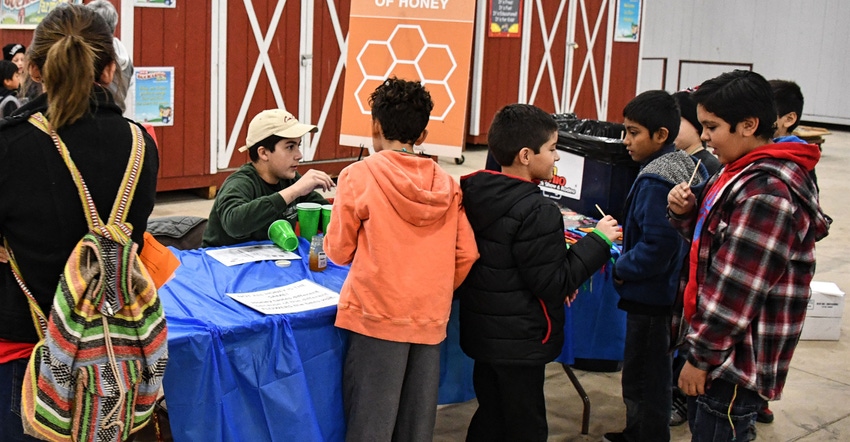November 19, 2018

More than 1,000 third- and fourth-grade students from elementary schools throughout Bexar County attended the recent two-day Kids, Kows and More agricultural education event presented by the Texas A&M AgriLife Extension Service and Southwest Dairy Farmers Association.
A steady stream of school buses brought the students, accompanied by teachers and adult chaperones, to the Cattle Barn area of the San Antonio Livestock Exposition grounds to learn more about agricultural commodities and related topics.
“We set up more than 20 education stations where the students could learn about various agricultural commodities such as eggs, meats, vegetables and dairy products as well as learn about insects and pollination, wildlife and natural resources,” said Natalie Cervantes, AgriLife Extension 4-H youth development specialist, Bexar County.
Presenters included AgriLife Extension personnel, volunteers from the Bexar County Master Gardeners and Bexar County Master Naturalists organizations, Texas Cattlewomen and Southwest Dairy Farmers.
“It was great that the kids got an opportunity to learn about agricultural production,” said Robert Canizales, a third-grade teacher from John Glenn Elementary in the Northside Independent School District. “Being here and interacting with the presenters gives them a chance to reflect on all the work it takes to produce these things and get a greater appreciation for them.”
As a more personal way of learning about agriculture, attendees were invited to get up close and personal with the insects, vegetables, plants, animals and other agricultural items on display. They were allowed to handle grubs and other insect decomposers, touch a cow, pet a live African spurred tortoise and feel the pelts of many types of wildlife found in the state. They also participated in arts and crafts activities such as building a terrarium and coloring with a dye made from insects.
“We made this year’s event more interactive than before and gave it a free flow so the teachers and kids could participate at whatever station they wanted,” Cervantes said. “It also allowed for the groups to be smaller and more spread out.”
One of the participants was Keyonna Cash, a fourth-grader from Douglas Academy in the San Antonio Independent School District.
“I really enjoyed learning about eggs and how they grow into chickens, and I enjoyed the honey tasting,” Cash said. “I learned about cows and other animals and got to see some bugs. I really like insects, and science is my favorite subject.”
Laura Estrada, a teacher at Douglas Academy, said she appreciated the opportunity to bring students to the event so “they could see things in a different light.”
“Many of these students are urban kids, and some have never seen a cow or watched vegetable plants grow in a garden,” she said. “It’s important they get to see where their food really comes from. I really like the way the stations have been set up so the kids can be more hands-on and learn at their own pace.”
Estrada said her school built a vegetable garden and created a compost pile, so having the students attend the event helped connect them with the results of tending and harvesting a garden.
Eliezer Escobedo, a fourth-grader from Knowlton Elementary in the Northside ISD, said he learned more than he expected.
“I learned a lot about cows and milk and dairy products,” he said. “I also learned about how vegetables are healthy and that cotton is used for making clothes and even paper money.”
Sandra Pierce, an AgriLife Extension program specialist based in El Paso, told attendees about cheese and other dairy products at the Curds and Whey education station during the event. Pierce has helped coordinate and present at Kids, Kows and More events in Texas, New Mexico and Oklahoma for the past 26 years. She said each year she reaches tens of thousands of young people through the Kid, Kows and More program and other agricultural literacy efforts.
“Over the years it seems kids have been getting farther and farther away from understanding about agriculture,” she said. “Many of them don’t even go to the grocery store and see items in the meat or vegetable aisle because their parents do all the shopping.
“With this growing disconnect between kids and agriculture, events like Kids, Kows and More are vital toward helping them get reconnected. They need to see these are not just commodities… they are life.”
About the Author(s)
You May Also Like




